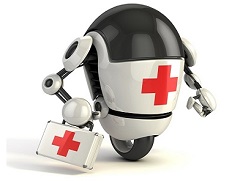Right on schedule, we’ve developed the great, great, greatest plan for medical care in the world. We haven’t copied England’s failing National Health, with its long, long waits for things like hip and knee replacements. We haven’t followed the Canadian method, which is simply a cut-rate drug store.
Instead, we have been inspired by the bank model. Banks all over the United States are abandoning their old, elitist buildings for Robo-banks. You can see them now in Minneapolis and Denver, where they’re tremendously popular, so popular that they’re appearing all over the country. No more long lines to cash a weekly paycheck, no more rows of tellers faking smiles as they accept deposits and withdrawals.
Forget the big desks, with so-called managers in suits sitting around all day waiting for someone to need a mortgage, a retirement plan or a personal loan. They’d give you a chair, a cup of coffee, and bad, bad advice. Terrible advice. The reason their advice was so terrible is that banks were going broke with all those people doing what robots can do without the expense of pretentious buildings in the center of town, lollypops for the kiddies, and heavy, heavy doors to suggest security. That terrible advice is why banks stopped paying interest eight years ago, when Obama was president. “Bank branches are dead, killed by the iPhone” said Peter Fitzgerald, the founder of Chain Bridge Bank, in McLean, Virginia. The similarity to Obamacare is so, so obvious, it’s identical.
From the outside, Robo-Meds recall the video-game arcades of the 1990’s, only instead of the racket of gameplayers you’ll hear requests for diagnoses. The machines stand shoulder to shoulder without partitions and don’t require fancy buildings in upscale districts. Actually, they don’t even need roofs. They’re portable and weather-proof, like the Porto-San conveniences found on construction sites. Robo-Meds automatically disinfect themselves after each patient. They will have waterproof curtains, so conversations will be semi-private; just you, your Robo-Doc and everyone else. Medical care will become a populist thing virtually overnight, replacing doctors’ offices with their bacteria-filled waiting rooms. The financial saving is huge for all concerned.
Clients using a Robo-Med may still have the limited option of being connected to a hospital for a Skype conference with a human, but only if the request requires an answer beyond the Robo’s depth of field. Your General-Robo will decide if your issue qualifies for this service. (“No” means “no”). Within months, that relic of assistance will be supplanted by Robo specialists well-trained by way-off-shore medical schools. So far, our plan immediately saves a trillion dollars, and we haven’t even mentioned the most important features.
The practice of medicine has already adapted to the Robo-trend, with online advice available to anyone with an iPhone or equivalent. There are thousands of practitioners who ask only that site-patients type in symptoms to receive an instant diagnosis. No one is obliged to settle for a mere second opinion, when so many choices are possible.
Your prescription will be immediately sent by Email, unless it is an Opioid, in which case both the patient and the prescribing Robo will be investigated by local law-enforcement.
All Robo-Med facilities will have a disease name prominently displayed on every machine. Choose only one from the screen. Non-paperwork will be only a few clicks away. There will be an outline of a human body like those offered now by orthopedists. You click first on the area of the problem: head, neck, trunk, arms or legs or back. Because the abdomen contains the heart, lungs, digestive system, kidneys, and more, much more, it has an outline of its own. Then list medications currently taken, checking off side-effects experienced, followed by your name, address, Email, and password. Your password must include your problem in a mixture of upper and lower case letters, followed by the prescription numbers of all medications taken within the last two years, without any spaces. This will be your permanent ID at your local Robo-Med. Nine and fine!
On your first visit, your body temperature and blood pressure will be immediately taken and sent to the Robo-Lab. You’ll feel a warm and welcoming hug. If the results show any abnormality, you will be directed to the Robo-Lab for the usual blood, etc. samples. You can talk to your Robo-Doc for as long as you like. When you leave, just slide your credit or debit card into the metered slot, as you would when leaving a parking lot. Rates will be calculated by the quarter-hour.
Following the pattern established by banks, after the system is permanently finalized sometime in the foreseeable future, surgery will also be offered by an adjoining Robo-Op-shop. These may have a ledge for seating during treatment. Or not.
Though now immensely costly and only performed at a few famous hospitals, Robo-surgery will be readily accessible at Robo-Op-shops once Obamacare is completely and finally repealed. Enormous hospital bills will be a distant memory of bygone days. Best of all, philanthropists will no longer need to donate huge sums to hospitals for naming opportunities, once they can endow a Robo-op-shop for next to nothing. The new system will reduce taxes so radically that they’ll virtually disappear. That’s the essence of the brand-new Health plan rolled out today. The brand in brand-new is the most recognizable and trusted one in the universe.

